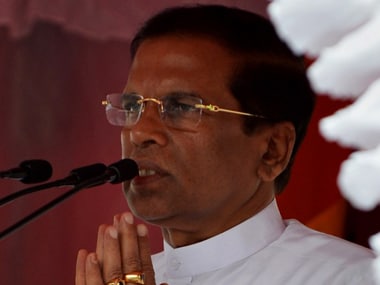Writing in the The Hindu, Eric Solheim, the former Norwegian envoy who tried to broker peace between Sri Lanka and the LTTE called the island’s new president Maithripala Sirisena, a man of destiny. Solheim expressed earnest hope that despite the socio-political complexities at home, Sirisena will be able to turn things around. He ends his article with this: “Unlike Mr. Rajapaksa, who was not invited by anyone, we will see Mr. Sirisena or Mr. Wickramasinghe in the White House and in European capitals fairly soon. In the end Sri Lankans voted for the “unknown angel,” Maithripala Sirisena. With support he may become Sri Lanka’s man of destiny.” Solheim is among the many - in Sri Lanka, India and the rest of the world - who think that the new president will be able to change the course of the island that was steeped in decades of racial hatred, nepotism, corruption and human rights violations. That a broad spectrum of political parties - from the right to the left - and the minorities are with him is both a source of relief and anxiety. Will the “man of destiny” change the destiny of Sri Lanka? The most important move that the western world, the UN and rights activists at home and elsewhere will be looking forward to will be if Sirisena sets out on a true path of reconciliation with the Tamils. It was public knowledge that Rajapaksa’s purported efforts at reconciliation were continued intimidation, militarisation and hoodwinking the international community. In the new president, who was overwhelmingly supported by the Tamils and Muslims, the world would expect a departure. [caption id=“attachment_2048449” align=“alignleft” width=“380” class=" “]  Sri Lankan President Sirisena. AFP[/caption] Pope Francis, who visited Sri Lanka, five days after Sirisena took over, summarised the need for reconciliation in unequivocal terms, when he said “The process of healing also needs to include the pursuit of truth, not for the sake of opening new wounds, but rather as a necessary means of promoting justice, healing and unity.” In his address after assuming office, Sirisena had promised ethnic and religious reconciliation. After the honeymoon period, the new president will certainly come under pressure from the international community, including the UN, to expedite a credible probe into allegations of war crimes, demilitarisation of the north and investigation of murders, disappearances and other human rights abuses, which will be the biggest test on Sirisena’s character and political sagacity. Sri Lanka’s politics is still dominated by Sinhala-Buddhist ideology which particularly worsened over the last ten years of active religious polarisation by Mahinda. To begin reconciliation with the Tamils, Sirisena has to first reverse the polarisation at least partly and then let reparative justice prevail. It’s a huge challenge. Mahinda in his election promise had said that he wouldn’t allow the prosecution of anybody for the war with the LTTE. But the UN and international community, as expressed by the Pope, would expect Sirisena to respect international law. Other changes that the new president will be expected to make are insignificant. It will include investigating corruption and other criminal charges against the Rajapaksa family, removal of the extra-constitutional systems allegedly established by Gotabhaya, tempering the island’s foreign policy, and creating a more rights sensitive society. All of these will be enough to make the Sri Lankans happy and herald him as their man of destiny. The economy will continue to grow at 7-8 per cent even if it sleeps, Europeans will continue to flock to its beaches and hills because it is great value for money and the country will be a better place to live. But for the Tamils, nothing will change without reparation and reconciliation. While the rest of the island enjoy the change, they will continue to live under occupation and daily threats of army surveillance and intimidation. Reports by journalists from the north even after the regime change show that the there is no change in the atmosphere of fear. Their wounds will not heal and nightmares will not stop. Their incessant sobs over the disappearance of their beloved will not end. In Sirisena, perhaps Sri Lanka will have a new destiny, but for the Tamils? The great advantage of the new president is that Tamils have very little expectation from him because he comes from the same socio-political stock of Mahinda. However, the enormity of change that he spearheaded burdens him with the responsibility of leading a country with equal rights for its citizens. As Solheim notes, “a lot can be done right away — language rights of the Tamils can be restored and the army can be removed from some of the lands it occupies in the north. Political talks with the Tamil National Alliance, the elected representatives of Tamils, can start.” He can also start the process of devolution. Tamils will need closure. Sirisena should at least begin the process however long it might take.
The most important move that the western world will be looking forward to will be if Sirisena sets out on a true path of reconciliation with the Tamils.
Advertisement
End of Article


)

)
)
)
)
)
)
)
)



